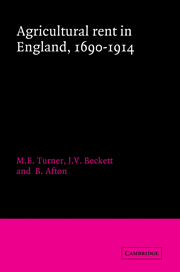Book contents
- Frontmatter
- Contents
- List of figures
- List of tables
- Preface
- Note on the text
- List of abbreviations
- Two examples of contemporary rent books
- Introduction
- 1 Agricultural rent in England
- 2 Contemporary views of rent in eighteenth and nineteenth-century England
- 3 The current state of knowledge
- 4 The determining parameters of a rent index
- 5 Constructing the rent index I: estate records
- 6 Constructing the rent index II: government inquiries
- 7 Constructing the rent index III: other studies
- 8 An English agricultural rent index, 1690–1914
- 9 Rent arrears and regional variations
- 10 The rent index and agricultural history I: the long term
- 11 The rent index and agricultural history II: the short term
- Conclusion
- Appendix 1 Sources of the rent index
- Appendix 2 Statistical summary
- Bibliography
- Index
2 - Contemporary views of rent in eighteenth and nineteenth-century England
Published online by Cambridge University Press: 02 December 2009
- Frontmatter
- Contents
- List of figures
- List of tables
- Preface
- Note on the text
- List of abbreviations
- Two examples of contemporary rent books
- Introduction
- 1 Agricultural rent in England
- 2 Contemporary views of rent in eighteenth and nineteenth-century England
- 3 The current state of knowledge
- 4 The determining parameters of a rent index
- 5 Constructing the rent index I: estate records
- 6 Constructing the rent index II: government inquiries
- 7 Constructing the rent index III: other studies
- 8 An English agricultural rent index, 1690–1914
- 9 Rent arrears and regional variations
- 10 The rent index and agricultural history I: the long term
- 11 The rent index and agricultural history II: the short term
- Conclusion
- Appendix 1 Sources of the rent index
- Appendix 2 Statistical summary
- Bibliography
- Index
Summary
Landowners and tenants agreed the rent of a particular property, but as we have shown in chapter 1 the process of assessment and collection was by no means straightforward. Since by its very nature the agreement was a private one, between the landlord or his agent and the tenant, neither party was usually keen to discuss the matter openly. Contemporary attempts to collect rental data were frequently thwarted by the reluctance of farmers to make the information publicly available. Since it was only in the later nineteenth century that the government made any real attempt to collect rental data on a systematic basis the consequence was that contemporaries knew relatively little about rent levels, and even the gregarious Arthur Young regularly failed to coax specific figures out of hesitant farmers. What we show in this chapter is how little contemporaries knew about rents; indeed, we shall argue that it is only with the availability of estate records which have been subject to public scrutiny through the opening up of record offices in the second half of the twentieth century that the data have become available from which any sort of systematic analysis of rents can be attempted.
Perhaps not surprisingly with such a widely understood but secretive subject, contemporaries speculated even if they did not really know very much about the course of rents. It was only really in the eighteenth century that serious attempts were made to collect rental data, and this was initially as a result of the work of Arthur Young who, in numerous trans-national tours, faithfully recorded rental figures quoted to him from tenants and landlords from across the country, and through different agricultural regions.
- Type
- Chapter
- Information
- Agricultural Rent in England, 1690–1914 , pp. 37 - 49Publisher: Cambridge University PressPrint publication year: 1997



